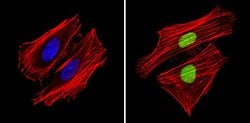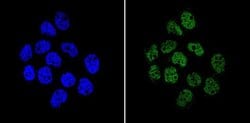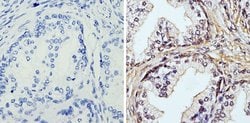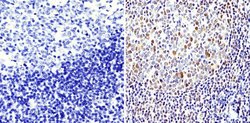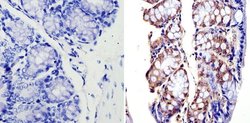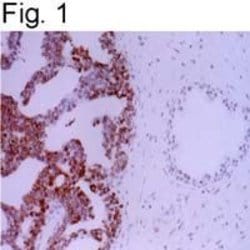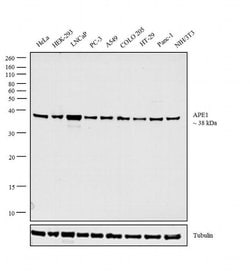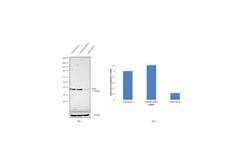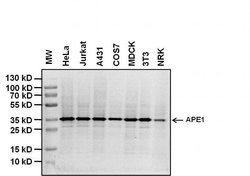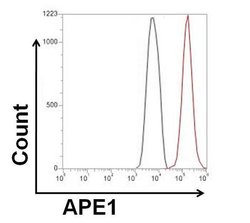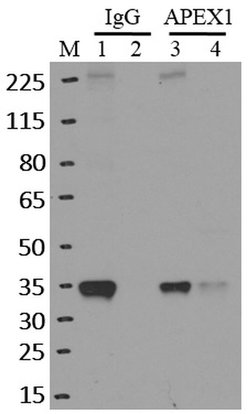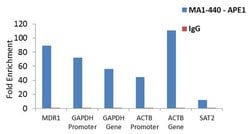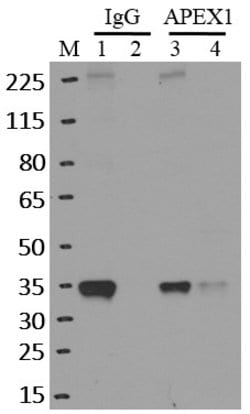Learn More
Invitrogen™ APE1 Monoclonal Antibody (13B 8E5C2)
Mouse Monoclonal Antibody
Supplier: Invitrogen™ MA1440
Description
MA1-440 detects apurinic/apyrimidinic endonuclease (APE/ref-1) from human, non human primate, canine, mouse and rat samples. MA1-440 has been successfully used in Western blot, immunohistochemical, flow cytometry and immunoprecipitation procedures. By Western blot, this antibody detects a 36 kDa protein representing APE/ref-1 in HeLa cell lysate. Immunohistochemical staining of APE/ref-1 in a variety of normal and cancerous human tissues, including ovaries, cervix, prostate, germ cell tumors, osteosarcomas, and rhabdosarcomas, with MA1-440 yields a staining pattern consistent with nuclear staining. The MA1-440 immunogen is full-length, recombinant human APE protein.
Mammalian apurinic/apyrimidinic endonuclease (APE/ref-1) is a multifunctional, bipartite enzyme that plays an important role in numerous, cellular functions. APE is responsible for repairing abasic sites in DNA and in regulating the redox state of other proteins that play roles in oxidative signaling, transcription factor regulation (Fos, Jun, NF-kB, Myb, HIF-1 alpha, CREB, Pax), cell cycle control (p53), and apoptosis. The most common form of DNA damage is the creation of abasic sites which are brought about through spontaneous loss or oxidative DNA damage, through chemically initiated hydrolysis (chemotherapy), ionizing radiation, UV irradiation, oxidizing agents, and removal of modified bases by DNA glycosylases. APE is differentially expressed during development and in different tissues. This protein has diverse subcellular localization patterns which support the possibility of its interaction with numerous, other cellular proteins in addition to DNA repair within the nucleus. Regulation of APE by phosphorylation is mediated, at least in part, by casein kinase II. Increases in APE message and protein levels are observed upon the reintroduction of oxygen to hypoxic cells, and in some malignant tissue relative to normal tissue. Decreases in APE expression have been associated with the induction of cellular apoptosis.
Specifications
| APE1 | |
| Monoclonal | |
| 1 mg/mL | |
| PBS with 0.05% sodium azide | |
| P27695, P28352, P43138 | |
| APEX1 | |
| Full-length recombinant human APE protein. | |
| 100 μL | |
| Primary | |
| Human, Mouse, Rat, Canine, Monkey | |
| Antibody | |
| IgG2a |
| ChIP Assay, Flow Cytometry, Immunohistochemistry (Frozen), Immunohistochemistry (Paraffin), Immunoprecipitation, Western Blot, RNA Immunoprecipitation, Immunocytochemistry | |
| 13B 8E5C2 | |
| Unconjugated | |
| APEX1 | |
| AP endonuclease 1; AP endonuclease class I; AP lyase; Ape; APE1; APEN; Apex; APEX nuclease; APEX nuclease (multifunctional DNA repair enzyme) 1; APEX nuclease 1; Apex1; apurinic/a; Apurinic/apy; apurinic/apyrimidinic (abasic) endonuclease; apurinic/apyrimidinic endodeoxyribonuclease 1; apurinic/apyrimidinic endonuclease; apurinic/apyrimidinic endonuclease 1; Apurinic-apyrimidinic endonuclease 1; APX; BAP 1; BAP1; deoxyribonuclease (apurinic or apyrimidinic); DNA-(apurinic or apyrimidinic site) endonuclease; DNA-(apurinic or apyrimidinic site) lyase; DNA-(apurinic or apyrimidinic site) lyase, mitochondrial; HAP1; protein REF-1; redox factor 1; redox factor-1; REF1; REF-1 | |
| Mouse | |
| purified | |
| RUO | |
| 11792, 328, 482558, 79116 | |
| -20°C, Avoid Freeze/Thaw Cycles | |
| Liquid |
Your input is important to us. Please complete this form to provide feedback related to the content on this product.
